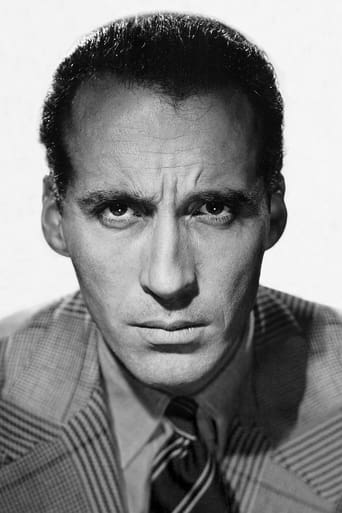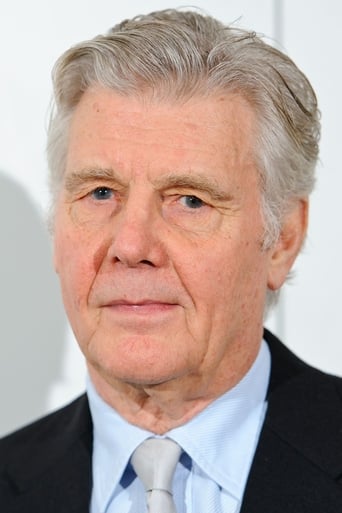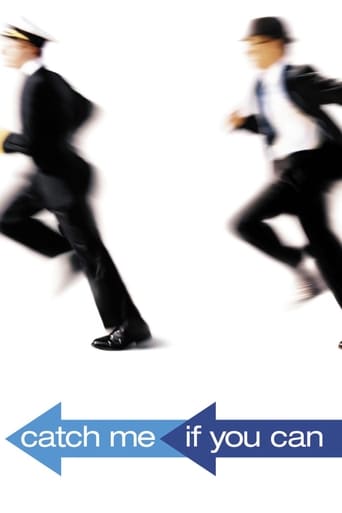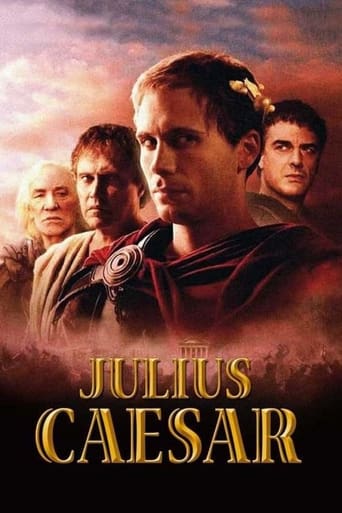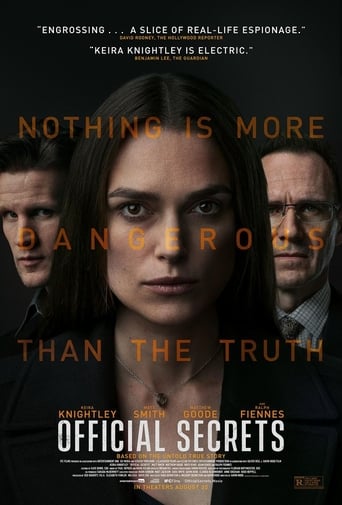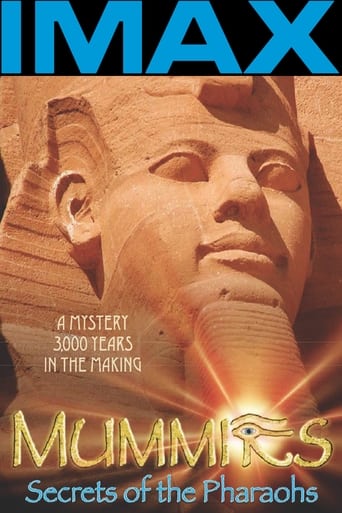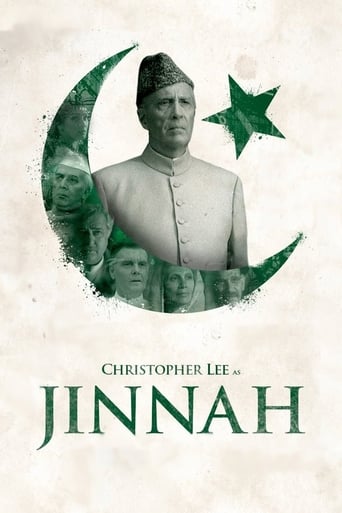
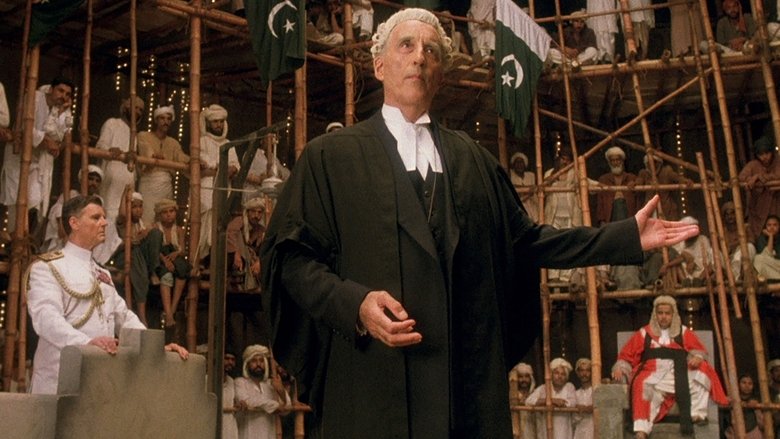
Jinnah (1998)
Biography of Mohammed Ali Jinnah, the founder of modern Pakistan is told through flashbacks as his soul tries to find eternal rest. The flashbacks start in 1947 as Jinnah pleads for a separate nation for the Muslim minority, infuriating Lord Mountbatten. Mountbatten then tries to enlist Gandhi & Nehru to persuade Jinnah to stop his efforts. Gandhi sides with Jinnah, which upsets Nehru. However, Jinnah turns down the offer to become prime minister and the film takes another slide back to 1916, which reveals all of the political implications that have occurred.
Watch Trailer
Cast
Similar titles

Reviews
I think this is a new genre that they're all sort of working their way through it and haven't got all the kinks worked out yet but it's a genre that works for me.
Load of rubbish!!
Very good movie overall, highly recommended. Most of the negative reviews don't have any merit and are all pollitically based. Give this movie a chance at least, and it might give you a different perspective.
It is a whirlwind of delight --- attractive actors, stunning couture, spectacular sets and outrageous parties. It's a feast for the eyes. But what really makes this dramedy work is the acting.
Jinnah, directed by Jamil Dehlavi, is a 1998 controversial biopic about the founder of Pakistan, Muhammad Ali Jinnah. Renowned Islamic scholar Akbar Salahuddin Ahmed wrote the movie's screenplay. Jinnah stars the legendary English actor Sir Christopher Lee in the titular role. The movie costars Shashi Kapoor, Richard Lintern, James Fox, Indira Verma, Maria Aitken, and Talat Hussain. Dehlavi, a London-based filmmaker of Pakistani-French origin, is best known for The Blood of Hussain (1980)—a highly contentious, critically acclaimed film banned by the Pakistani military dictator at the time, Muhammad Zia-ul-Haq, as he believed the movie purposefully took digs at his tyrannical regime. Dehlavi effectively got relegated to the status of a persona non grata in Pakistan. Dejected and heartbroken, he later moved to the UK in want of creative freedom. Unfortunately, Dehlavi's controversial past would come back to haunt him two decades later during the filming of Jinnah.Dehlavi's contentious choice of making a western Christian—that too someone whose most famous portrayal hitherto had been that of Count Dracula—to portray the part of Muhammad Ali Jinnah didn't go well with the extremist elements in Pakistan. The government of Pakistan withdrew its funding halfway through the film. Christopher Lee received death threats and the activists demanded for his arrest and deportation; Lee had to be surrounded by armed bodyguards throughout the shoot. As a result, Jinnah was never really afforded a proper theatrical release in Pakistan. Christopher Lee considers Jinnah to be the greatest achievement of his long and illustrious career.The cinematic importance of Dehlavi's film can be easily gauged by the fact that till date it has been cinema's first and only major attempt at capturing in essence the philosophies and principles that underlined Muhammad Ali Jinnah's life. Before examining the movie further, it's essential to first try and demystify the enigma that was its subject: Muhammad Ali Jinnah. And, in order to fully grasp that, one needs to take the cognizance of the stature that Mr. Jinnah enjoyed at the time of independence. In many ways, he was Mohandas Karamchand Gandhi's arch nemesis, if ever there is one. In fact, it wouldn't be a hyperbole that, at the time, among Mr. Gandhi, Mr. Jinnah and Lord Mountbatten the future of India hung in the balance.The official announcement of the Partition of India, as per the Mountbatten Plan, triggered a chaos on both sides of the newly established border as massive population exchanges started occurring between the two newly formed states in the months that immediately followed. The end result was a massacre of humongous proportions that claimed hundreds of thousands of innocent lives (mostly Hindus, Muslims, and Sikhs) on both sides of the border. Jinnah being the grand architect behind the partition of British India into two separate states based on religion, a Hindu state and a Muslim state, was hailed as a hero in the newly formed state of Pakistan. But, in India, he was dubbed as a villain, was held responsible for the deaths of hundreds of thousands of innocent people. More than six decades have past but very little has changed. Mr. Jinnah continues to remain one of the most enigmatic, controversial and misunderstood figures in History.The treatment that Dehlavi gives his movie is no less interesting than his subject. He chooses to present Mr. Jinnah's tale in form of flashbacks. The opening scene of the movie shows a terminally ill Mr. Jinnah, accompanied by his sister and confidante Fatima Jinnah, being taken in an ambulance to some hospital. The next scene cuts to an anteroom situated somewhere between Heaven and Hell where Mr. Jinnah is greeted by a friendly, humanoid Angel (played by Shashi Kapoor) who has an hour and a half to prepare Mr. Jinnah's case, the outcome of which would decide his fate. Will he be convicted or absolved? Will he go to Hell or Heaven? As Mr. Jinnah defends the accusations made against him, the audience is treated to sumptuous vignettes from different junctures in History as the story follows important events in Mr. Jinnah's life (not necessary in a linear fashion): be it his early days as a love- struck lawyer who dotes on a beautiful Parsi girl named Ruttie (whom he eventually married); his later days as the greatest adversary of Mahatma Gandhi; or his brief stint as the 1st Governor General of Pakistan before finally succumbing to tuberculosis. Overall, Jinnah proves to be an important work of cinema that presents the caricature of a highly misunderstood man whose turbulent but celebrated life made his name a synonym for controversy. Jinnah had the courage to do what he felt was right for the greater good of his people. Although the movie is far from being flawless, it works well on the whole. The historical accuracy is undeniably questionable. The movie might upset those who lack forbearance. While the movie scandalizes Lord Mountbatten for being biased towards India, it takes a rather playful swipe at Mr. Nehru and Lady Mountbatten. Christopher Lee plays the part of older Jinnah with scalpel-like precision, Richard Lintern deserves a special mention for his arresting portrayal of the young Jinnah. James Fox (who plays Lord Mountbatten) and Maria Aitken (who plays Lady Mountbatten) are nothing short of being brilliant. Shashi Kapoor is charming to watch in the role of an Angel. These major performances are well backed up by the movie's support cast. But, Jinnah is not a movie for everyone.Only those with open minds should watch it, for it's bound to hurt the sentiments of those who lack tolerance and empathy. 9/10A more in-depth review can be read at:http://www.apotpourriofvestiges.com/
The man M.A.Jinnah in my opinion wasted and spoiled his life for an incapable , callous corrupt nation nation like Pakistan.Although he was a man who thoroughly believed in what he do , always kept his principles come 1st, what he meant he really do but he failed to forecast what his followers will do to his country for which he made hard efforts to build. He had a vision of a brighter prosperous Pakistan but what Pakistan now ,a state failed, engulfed in corruption, nepotism, religious extremism , lawlessness, unemployment , poverty and disunity. So Gandhi and Nehru were also right on their behalf when they opposed the creation of Pakistan. A group of religious school of thought was also against Mr Jinnah they even tried to assassinate him , they belonged to Deobandi school of thought , todays taliban are their followers. If he knew what is going to happen inside this country years after he would had never worked for a separate homeland for Muslims, he would had understand it will be completely useless. Unfortunately some few of his fellow comrades persuaded him to much for this adventure and he finally succumbed to their idea. Soon after his death they immediately entangled in struggle of power and the whole purpose was lost for ever. Even in the name of Islam Pakistanis failed save eastern part now Bangladesh because not to give them authority and their proper share in country' s economics. Now this country is in more pain, routine suicide bombings and lawlessness, recently in sialkot city , 2 teens bros were mercilessly brutally beaten to death by a mob right in presence of police and thousands of callous spectators,(watch it on youtube , you ll see the plight of this country). If talking about this film i will say that however this movie may be very good , maybe accurate but if the future a Pakistan is concerned this country now is a failed state and its not gonna last,nobody can save it. Mr Jinnah this nation should owe you an apology. It would had been better if you might had accepted the idea of united India.
This is a high-quality biopic on the life of Jinnah, and an excellent film in general. It is a great character portrayal of a key figure in the history of the Indian subcontinent, and it peels away layers of Jinnah's life in the context of the events that shaped the independence struggle and the partition into India and Pakistan. The pace of the movie is unhurried and yet engaging; all the key actors have done a superb job of portraying their characters well and lent them credibility and depth. Lee, Fox, Kapoor, and Lintern were especially notable.Being from India, I especially appreciated the opportunity to learn more about the life and persona of Mohammed Ali Jinnah, who no doubt was among the most important historic figures of the time that shaped the history of the two countries. I liked the form of the film where Jinnah is challenged and questioned on many of the events in his personal life and on his political ideology. I feel that the film does an honest job of addressing and delving into those issues from his perspective and taking the viewer on an intimate journey into his motivations.The partition is a sensitive, politically charged, and often divisive issue for the people of India and Pakistan; the scars on either side are deep and not too distant. However, films like Jinnah and also Gandhi to some extent offer a critical glimpse into the human aspects of the leaders of those times and what made them Quaid-e-Azam or Mahatma for the people then and also for the generations that followed.
Sometimes you watch a mindless movie to enjoy your popcorn - something like a Batman Begins or a Planet of the Apes. Sometimes you watch a movie to understand more about a civilization or a leader or an historical event - like a Micheal Collins or an Amistad. Sometimes you watch a movie for its sheer unpredictability like a Memento or a Usual Suspects. Then you come across a brilliant movie like "Jinnah" which weaves mindlessness, history, leadership and unpredictability into one seamless work of art. So you have Gandhi and Nehru using computers in the afterlife, Jinnah conversing with an angel and all 3 of them time-traveling to the 1990s in the after-life! And this is a bio-pic, not a futuristic movie, mind you. But the director's magic is fairly convincing (especially if you are hare-brained, like I am!) You have a man preaching religious tolerance demanding a separate nation for muslims based on their religious affiliations and to show how complex a character the protagonist is - he asks his daughter not to marry a non-Muslim. Despite the shades of gray, what stands out is that the man Jinnah is as pure as nectar or as pure as the water of the Ganges today is. However, what truly takes this movie to a league of its own is a simple truth that has eluded man since eternity. The director seems to be saying, "You idiots just don't get it! Do you?" How do you convince a man to cede an entire nation that he doesn't even rule to you? Well, you ignorant human being - YOU SLEEP WITH THE MAN'S WIFE. This nugget of truth is captured in a classy fashion as Nehru and Lady Mountbatten are shown in a bedroom scene. And how does Earl Mountbatten, the Viceroy of India, the Queen's own cousin react to this affair between his wife and his "friend"? He reacts as all good humans should - he rewards Nehru with the State of Kashmir! That Kashmir belongs to the Maharaja of Kashmir and not the British Crown is obviously irelevant. It is the director's way of showing us how far-sighted the British were - they realized that "awarding" Kashmir to India would continue their "divide and rule" policy. This is the director's ode to the Indo-Pak peace process. The angel, the time-travel, the hypocrisy of the main lead showcases the ability of the director to interweave different GENRES into one linear narrative. I honestly challenge Coppola, Spielberg or Scorcese to DARE to even ATTEMPT to make such a movie. Keeping with the theme of the movie, I defy Stanley Kubrick to come back from the dead and top the director. And what can one say about the acting? Nothing??? Of course not. Unlike, Ben Kingsley who is half-India, Christopher Lee playing Jinnah is a bonafide Caucasian. One can begin to marvel at the greatness of the director to see that only a white man could play the role of earnest and FAIR (Pun??) brown man. Christopher Lee excels and is almost as expressive as an oak. The crisp editing of the linear storying telling is as pleasing to the eye as the molecular structure of an atom. Wolpert, eat your heart out and Mr. Jamil Dehlavi, take a bow. You have shown the world how a movie is truly made. It was definitely worth the rental if not more - I am almost sure I would have wasted the money otherwise on dope.
